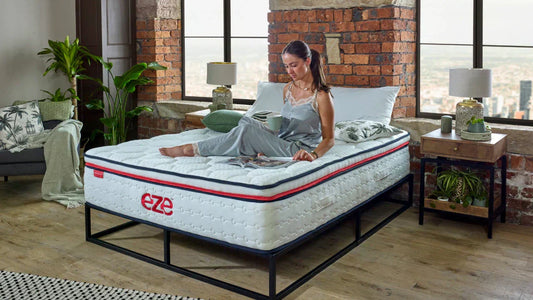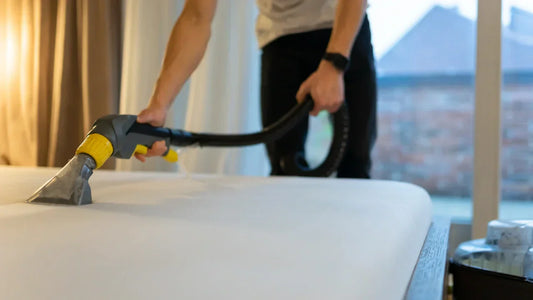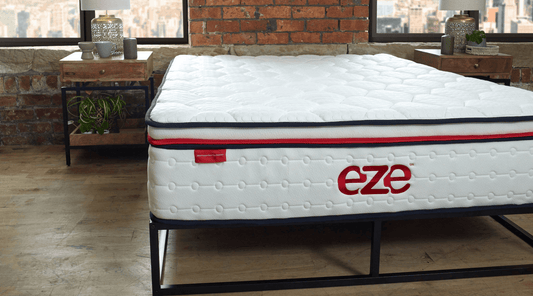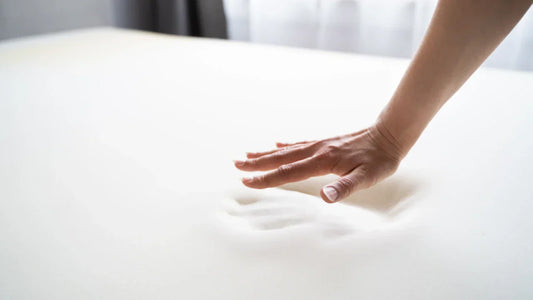Research shows low sleep quality has a profound effect on our physical performance, will power and even attention span. These are the things that can have a huge impact on how we live our lives and how much we are able to get done in a day.
Low quality sleep has been linked to an increase in chronic conditions such as diabetes or Alzheimer's disease amongst many others.
Truth is that nowadays, the sleep quality of most people is not what it should be. We can put this on many aspects of our everyday lives.
Our schedules have become hectic, caffeine consumption is higher than ever and sometimes it’s hard to get to bed at a healthy time.
However, these are just a few surface factors influencing your sleep.
Leaving out the obvious (don’t drink late coffees, have a consistent schedule, wake up early,...) we have created a list of 5 not-so-well-known things that will help you improve your sleep and therefore, your life.
If you get just 5% better in each of these categories, you will see significant results in the first few days.
Make your room dark and quiet
The way you have your bedroom set up influences your sleep to a very high level. Most people don’t realize this and therefore, don’t make any conscious effort to improve it. It’s been proven that as little as a street lamp shining into your bedroom can reduce your sleep quality significantly.
Very similar results have been shown when looking at noises such as cars passing on the road or people chatting on the street.
When it comes to light you can use blackout curtains which you can attach to your bedroom window to make the room totally dark. Another option is using an eye mask.
Street noises can be countered with a technique called “sound masking”. You can use a steady, consistent noise such as a fan, brown noise or a tv static to fight the noises from the outside.
After some time, you will get used to the consistent noise and it will “blend” with silence.
Keep it cool
There are three main factors that let your body know it’s time to get sleepy
Your circadian rhythm - the time when you woke up and the time you usually go to bed. A drop in light levels - when it gets darker, your body knows you will soon go to bed. This is why it’s a good idea to turn off the main lights at night and use a desk lamp with a low watt lightbulb, or candles.
Lower temperature - as the night approaches and it gets darker, it also gets colder. Your body needs this “tell” to fully recognize that the night is coming and to start getting tired. Yet, so many of us are unaware of this fact. We keep the radiators going and we use thick duvets to cover ourselves.
Temperature receptors cover your skin all over. If you choose to wear an extra layer of clothes instead of increasing your heating in the night, the receptors on your hands, face, etc. will still recognize the drop in temperature and signal your body of approaching night-time.
Get the right mattress
A lot of people don’t realize this, but your mattress matters, and not just when it comes to quality.
You don’t just need the right mattress. You need the right mattress FOR YOU.
Just think about it. We all have different feet, so we prefer different shoes. We all brush our teeth different so we choose different toothbrushes.
Well, we all sleep different, so we need different mattresses.
If you sleep on your back, your mattress has to allow your spine to “sink” into its natural position.
If you sleep on your stomach, you don’t want to “sink” because you’ll overarch which can lead to serious health issues down the line.
Choosing the right mattress is usually quite complicated with so many different types out there.
We believe that something as important for your health shouldn’t be complicated. That’s why we created 4 mattresses suitable for every type of sleeper.
Get loads of light during the day
The amount of light getting into your eyes helps your body understand what time of the day it is.
The more light you see, the less “night hormones” such as melatonin and oxytocin get produced.
Your body can’t start producing these hormones from one second to another, it gradually builds up the production over time.
By getting a lot of natural sunlight during the day, you are helping your body to determine what time of the day it is and how much of certain hormones should be getting into your brain.
Make sure your body sees light during the day, and darkness during the evening. This will greatly help your sleeping consistency.
Go to bed when tired
Have you ever been sleepy in the evening, but it was too soon so you waited a bit only to find yourself get a surge of energy that would prevent you from going to sleep for a few hours?
This phenomenon is called the second wind.
Your body and hormones are still working the same way they used to when people lived in caves.
If you’re tired but not going to sleep, your body thinks there is only one thing that can be happening.
It’s not safe to go to sleep.
That’s why it provides you with a dose of adrenaline, noradrenalin and cortisol to provide you with energy and alertness to get out of the dangerous environment, back to safety where you can go to sleep.
Go to bed once you get tired, even when you think it’s too soon to sleep.
Your body is probably trying to make you sleep soon because you accumulated sleep debt and need to catch up.
You might wake up sooner the next morning and get something extra done before you start your day.









